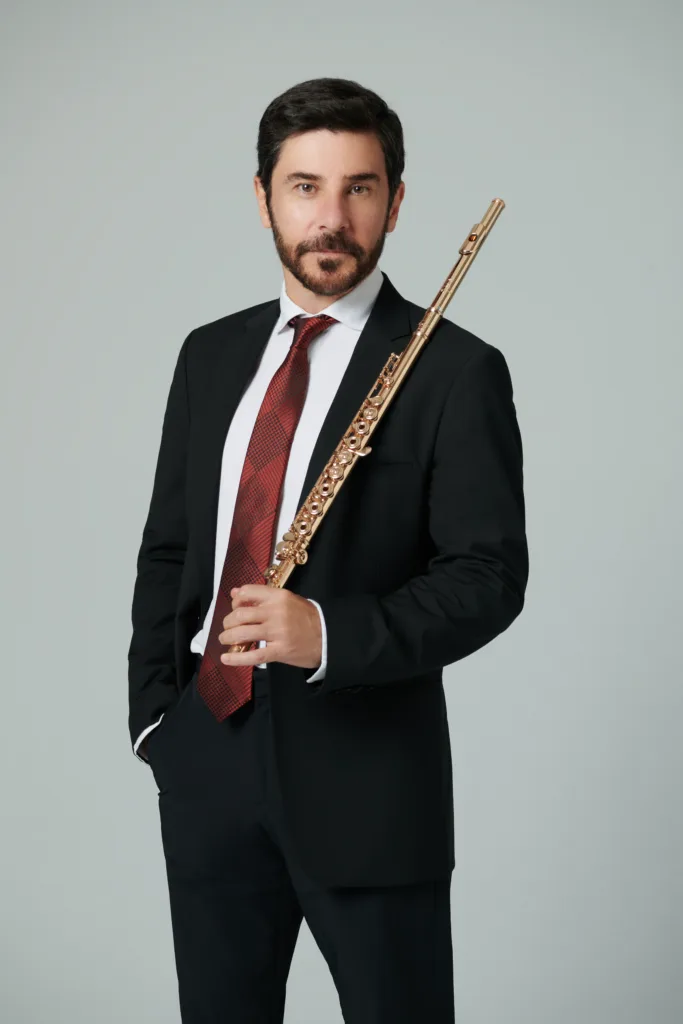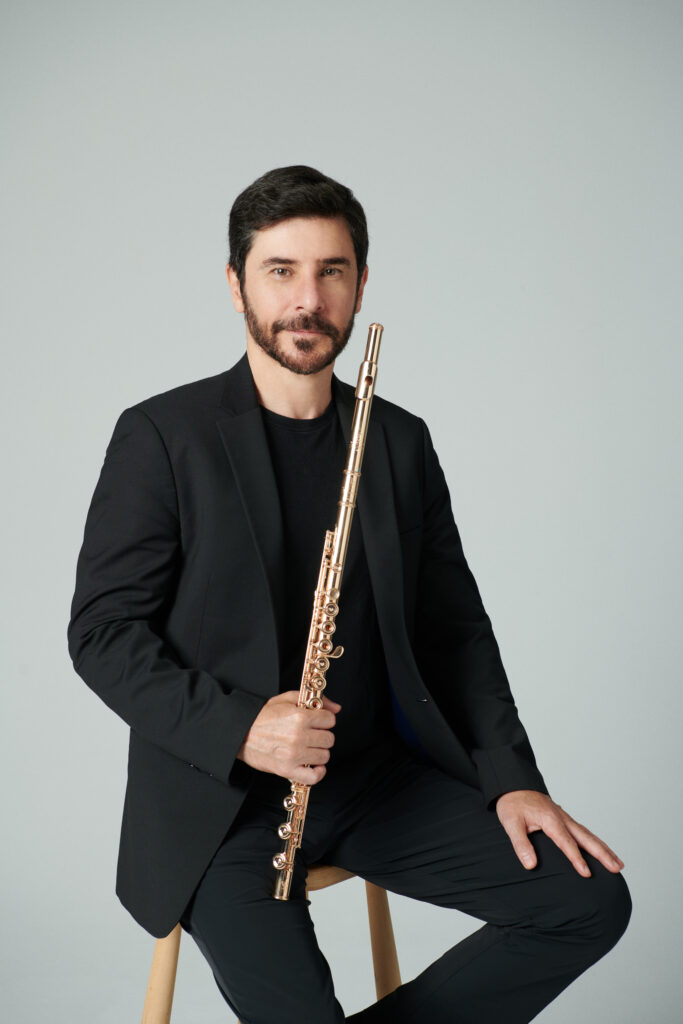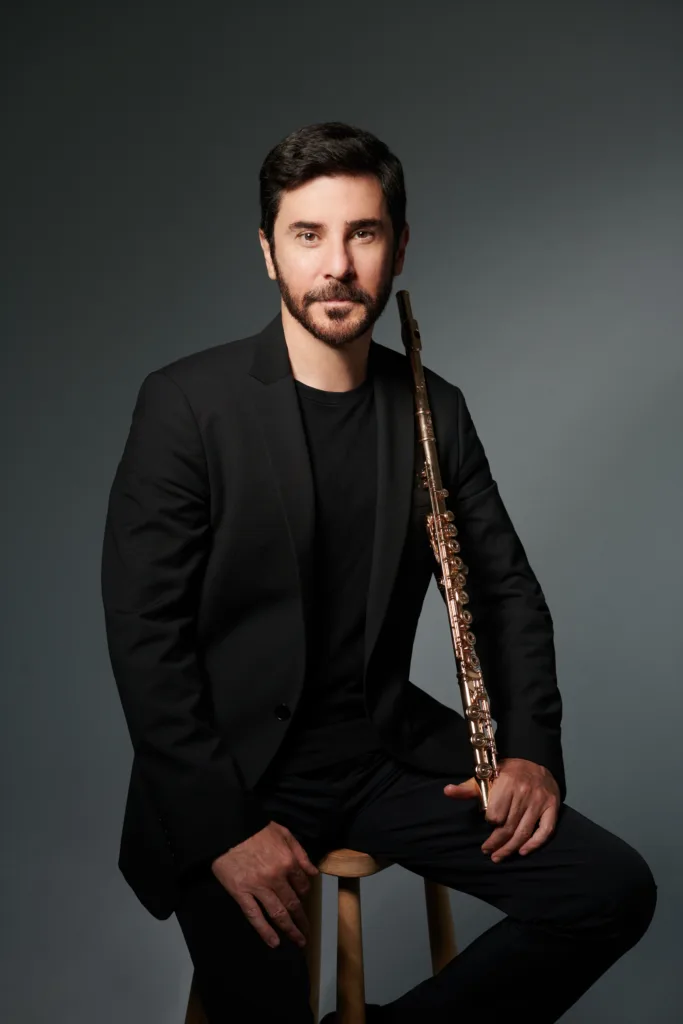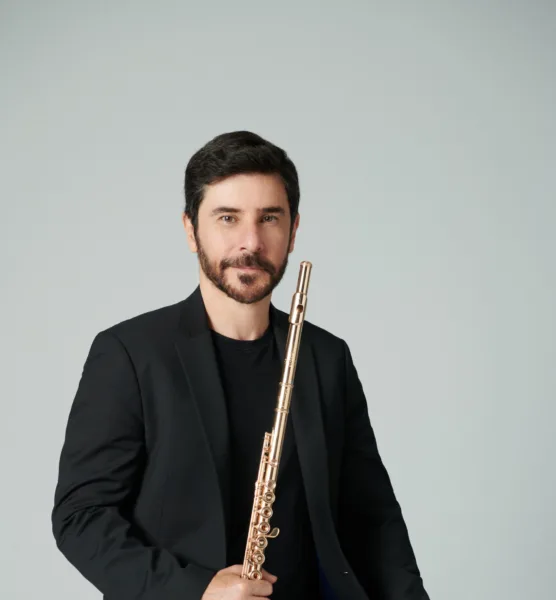Bulent Evcil, an illustrious Turkish solo flutist, stands as a beacon of virtuosity in the realm of classical music. Honoured with the Royal Belgium Encouragement Medal of Art, his talent transcends borders. Notably, he clinched the second place in the prestigious Best Overall Performer Award at the 4th James Galway International Flute Seminar in Dublin, earning acclaim from the legendary James Galway himself. Evcil's mesmerising performances have graced stages across the globe, from Europe to the Americas, captivating audiences in renowned festivals and prestigious venues. With a rich legacy spanning Vienna to Istanbul, he continues to elevate the art of flute with unparalleled mastery.

Can you share with us some important moments in your early years that led you to choose the flute as your primary instrument, and what inspired you to pursue a music career?
Since I was a kid, I was raised in a family immersed in music. Both my father and mother were music teachers, and my oldest brother was a violinist who studied at the conservatory. Upon graduating, he secured a position in the Istanbul State Opera Orchestra. Growing up, classical music filled our home—from Tchaikovsky’s Violin Concerto to Beethoven’s symphonies, Brahms’s symphonies, and Mahler’s symphonies. I felt like I was nurtured by music from the moment I could understand it.
At the age of 10, I applied to the State Conservatory of Istanbul, part of Mimar Sinan University. During the entrance exams, I initially expressed a desire to learn the cello. However, the cello teacher advised against it, citing that my hands were too small for the instrument, which might hinder my progress. Instead, the flute teacher suggested that I was physically suited to play the flute. Despite my initial resistance, I eventually accepted their advice after consulting with my father, who wisely urged me to trust the expertise of the instructors.
Thus, my journey as a flute player began, thanks to the guidance of Müker Emberk, a revered figure in Turkish music who recognised my potential. I am forever grateful to him for selecting me to pursue the flute. Over time, my love for the flute deepened, and it became an integral part of me, akin to my hands, eyes, or ears. From that moment on, I dedicated myself to mastering the flute.
Looking back, my brother served as a significant source of inspiration during my formative years.
Having trained under Prof. Mükerrem Berk at the State Conservatoire of Mimar Sinan University and later under Marc Grauwels at the Royal Brussels Conservatoire, how have these experiences shaped your musical style and approach to playing the flute?
Well, in answer to this question, Professor Mukheryam Berk was a great pedagogue. He was a fantastic man who not only understood how to teach the flute but also the psychology of very young students. He approached us with kindness and encouraged us to interact with other teachers and important figures in the arts, culture, and music scenes. He arranged for us to perform for various individuals, such as the harp, composition, or violin teachers, which provided us with invaluable exposure and helped build our self-confidence. This experience was crucial in overcoming performance anxiety in the future. I am deeply grateful for the opportunities he provided and consider myself fortunate to have been his student.
Afterwards, I won a national competition for woodwind instruments in Turkey and earned the first prize. Subsequently, I was sent to Belgium for a recording and concert at a very young age, around 17 or 18. It was there that I encountered Marc Grauwels for the first time, through his CDs and performances. I was immediately drawn to his style and decided to pursue studies with him in Europe. I successfully entered his class in Brussels, and within six months, he transformed my flute playing entirely. Under his guidance, I developed a deeper, darker sound with a rich palette of colors and articulations. His teaching not only enhanced my musical abilities but also imparted valuable life lessons, such as the importance of socializing and enjoying life outside of rigorous practice sessions.
Marc introduced me to various culinary experiences, including sushi, which I had never tried before. He emphasised the importance of balancing hard work with leisure activities, believing that a well-rounded lifestyle would ultimately improve my flute playing. I learned to appreciate life's pleasures while maintaining dedication to my craft. Overall, both Prof. Berk and Marc Grauwels have had a profound impact on my musical journey, shaping not only my flute technique but also my approach to life.
Winning the Royal Belgium Encouragement Medal of Art is a significant accomplishment. Could you tell us about the impact this recognition has had on your career and the opportunities it opened up for you as a flutist?
Winning the Royal Belgium Encouragement Medal of Art was a significant accomplishment for me. This medal was awarded to young and promising artists who were excelling in their studies in Belgium. I was honoured to be recognised by the director of the Mons Conservatoire for receiving this prestigious award. It was a proud moment for me, and I always include it in my curriculum vitae with pride.
While I cannot definitively say that winning this medal opened specific doors in my career, it had a profound impact on me personally. Receiving this recognition reaffirmed my belief in my abilities as a flutist and provided much-needed encouragement during my formative years. As a young musician, having this validation helped boost my confidence and reinforced my commitment to pursuing a professional music career. It served as a psychological support, bolstering my belief in myself and my potential as a skilled flutist.

James Galway has praised you as one of the best flutists of your generation. How did this endorsement from such a renowned figure in the flute world influence your artistic journey and confidence in your abilities?
When Sir James Galway made those remarks, it was quite overwhelming to hear. He isn't one to offer such praise lightly, so receiving his endorsement was truly humbling. Knowing that he considers me among the very few exceptional flutists he has recommended fills me with immense pride. His endorsement has undoubtedly been a game-changer in my career, opening doors internationally and prompting other prestigious institutions to take notice of my talent. Thanks to his recommendation, I've had incredible opportunities, from performing in Brazil to being a soloist with the South Polish State Symphony Orchestra and the Lemberg Chamber Orchestra in Ukraine, as well as touring Switzerland and Poland. Perhaps the most significant highlight was being selected as the solo flutist for Arturo Toscanini's Philharmonic Orchestra. This orchestra's reputation precedes it, and being chosen to play with them, especially under the baton of the legendary conductor Lorin Maazel, was a dream come true. I owe so much of this success to Sir James Galway's endorsement. It has motivated me to continuously strive for excellence, to constantly improve, and to ensure that I always live up to the honour of his words.
You received the "Diplome Superieur avec Grand Distinction" and won the "Premiere Prix" in chamber music at the Royal Brussels Conservatoire. How did this recognition contribute to your development as a chamber musician, and how do you approach collaborative work with other musicians?
Since I was a child, I've always harbored a desire to study in Europe, particularly in renowned Western music schools dedicated to classical music. Winning the national competition allowed me to pursue studies at the Brassus Conservatory, where I achieved these distinctions. Undoubtedly, these achievements have significantly shaped my musical journey, refining my technique, interpretation, and collaborative skills as a flutist. Engaging in numerous duets and chamber music ensembles with a variety of instruments including winds, piano, violin, and cello, has honed my ability to synchronize with fellow musicians, fostering a deep understanding of ensemble dynamics and musical interpretation.
Through my immersion in chamber music, facilitated by these diplomas and the rigorous training at esteemed institutions like the Royal Conservatory of Brassus, I've developed a multifaceted understanding of musical periods spanning from the Baroque to the Romantic era and beyond. This education has equipped me with the ability to discern and interpret diverse musical styles, allowing me to approach each repertoire with authenticity and versatility. Consequently, I've cultivated a nuanced approach to performance, adapting my playing technique and interpretation to suit the unique characteristics of each musical genre, whether it be classical, romantic, or contemporary.
Could you share some insights into your experience studying at the Heidelberg-Mannheim Music Academy under Jean-Michel Tanguy and obtaining the "Qualification of Art" degree with the highest distinction? How did this period of study shape your artistic growth?
After completing my studies at the Brassus Conservatory, I pursued advanced education in Germany, drawn by its renowned classical music institutions. The Heidelberg-Mannheim Music Academy held particular significance, with Mannheim's historical ties to Mozart and its esteemed reputation. Under the tutelage of Jean-Michel Tanguy, a distinguished French instructor, I honed my skills in both Baroque and Mozartian repertoire, essential for any aspiring flutist.
Studying at the academy provided an enriching environment conducive to growth. The extensive library afforded access to a plethora of flute music, facilitating comprehensive learning and exploration. Additionally, I had the privilege of receiving chamber music instruction from Mikhail Hazel, former solo piccoloist of the Berlin Philharmonic, further enriching my musical education.
Attaining the 'Qualification of Art' degree with the highest distinction was a testament to the academy's rigorous standards. Monthly assessments, overseen by esteemed woodwind faculty, fostered a culture of continuous improvement and healthy competition among students. Participation in the academy's orchestra and opportunities to perform with professional ensembles such as the Saarbrücken Radio Symphony Orchestra provided invaluable real-world experience.
My time at the Heidelberg-Mannheim Music Academy not only refined my technical proficiency but also instilled in me the discipline and resilience necessary for a music career. I am proud to carry the diploma from such a distinguished institution and am grateful for the formative experiences it provided on my journey as a flutist.
Your involvement in the 4th James Galway International Flute Seminar in Dublin earned you the second-place award in the Best Overall Performer category. What memories or lessons from that event have stayed with you throughout your career?
Well, it was in Dublin, and before that, Sir James Galway always held his summer seminars, festivals, and masterclasses in Switzerland. He decided to host one in his homeland, Dublin, Ireland. Additionally, there was the Crystal Flute Award, a prestigious accolade. The best performer would receive this award, and there were also second and third prizes. With over 75 participants, you secured second place, earning the recognition for best performer at the festival. This achievement opened up incredible opportunities, including becoming a private student of Sir James Galway. I still remember Lady Ginny Galway, Sir James Galway's wife, approaching me and offering private lessons with him. It was an incredible chance, especially as I could have lessons not only during the summer seminars but also in the winter whenever Sir James was near Brassus, where I was studying at the Brassus Royal Conservatory. They even offered to cover all expenses for travel whenever he was in the area. This experience was transformative, marking a significant turning point in my musical journey.

As a flutist, have you performed in Greece and engaged with Greek culture and arts? Are there specific aspects of Greek culture that you find particularly inspiring in your artistry?
Yes, I've been to Greece, and I've had the pleasure of performing there numerous times. Because I am from the Mediterranean coast of Turkey, my mom hails from Izmir, Smyrna, and I've frequented Izmir many times; the city bears a striking resemblance to Thessaloniki. I've performed as a soloist with the Thessaloniki Municipality Orchestra, held recitals in Thessaloniki and Athens, collaborated with the Bordeaux-Saint-Philharmonic Orchestra for performances at Megaron in Athens and Thessaloniki, and participated in a TV recording concert with the Athens Municipality Orchestra. Through these experiences, I've had the opportunity to work closely with Greek musicians, and I must say, our similarities are striking—we're both open-hearted and our culinary traditions, particularly along the Mediterranean and Aegean coasts of Turkey, bear resemblance. I hold a deep appreciation for Greek culture and arts. One particularly memorable collaboration was our performance of Iannis Xenakis’s oratorio, "Oresteia," with the Bordeaux-Saint-Philharmonic Orchestra, which we presented in both Athens and Istanbul. Personally, I often choose to spend my holidays in Greece; I find the culture enriching, and the holiday spots, especially in the summertime, are serene. The Cyclades Islands, in particular, offer a tranquil escape from the heat of July and August, with their refreshing Aegean winds. I've also fostered many collaborations with Greek musicians and conductors, and I eagerly anticipate more opportunities to work with them in the future. Greece holds a special place in my heart, and I cherish every chance I get to engage with its vibrant cultural scene.
Looking ahead, could you share some of your plans and aspirations as a flutist? Are there specific projects or collaborations that you are excited about?
Certainly! One of the highlights I'm eagerly anticipating is performing Joachim Rodrigo's challenging masterpiece, the Concerto Pastoral. Regarded as one of the most demanding flute concertos ever written, I had the privilege of showcasing it alongside the Istanbul State Symphony Orchestra on March 1st. It was a profound personal goal, and I dedicated extensive practice to ensure a soulful rendition.
Following that, I had several concerts in Istanbul and received a significant invitation to perform in St. Petersburg, Russia, alongside the esteemed Mariinsky Theatre Orchestra, featuring Fazasai's Flute Concerto in April 2024. These projects are pivotal for me, each offering unique artistic opportunities and challenges.
Additionally, I'm excited about a new recording project. The Flute World, composed by Fazasai, features captivating solo pieces for various members of the flute family, including piccolo, alto flute, and bass flute. I had the pleasure of recording these pieces two years ago, and the album was recently released in April. The compositions by Fazasai are particularly intriguing, and I'm thrilled to share them with audiences worldwide.
In your journey as a solo flutist, how do you balance preserving the classical traditions of flute performance with incorporating innovative elements into your work?
I have studied classical music and classical flute playing, but I am not narrow-minded. In addition to classical repertoire, I have recorded pieces that incorporate elements of Turkish and Middle Eastern music, Israeli music, Arab music, and Turkish music, all of which are deeply rooted in their respective regions. I love playing a diverse range of music that is well-written, offers good prospects, and embodies thoughtful composition. I am always open to playing new styles. Some years ago, I also performed many jazz concerts, including pieces written specifically for flute and piano, as well as compositions by Claude Bolling, such as his Jazz Suite, and pieces by Mike Mower, like Sonata Latina. I believe it's fantastic to explore beyond the confines of classical music and embrace different genres. When presented with good music, I approach it with positivity, and if I enjoy it, I will play it. I am not confined to playing only classical music on the flute; I also enjoy exploring jazz and traditional music. Thank you for this wonderful interview and for allowing me to share my perspective.


